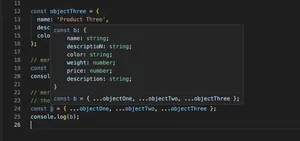Introduction
TypeScript adds additional features to JavaScript such as static typing. Working with numbers in TypeScript is straightforward because it builds on the existing JavaScript capabilities, yet offers benefits like type safety and better tooling to catch errors early in the development process.
Basic Number Operations
In TypeScript, numbers are used in the same way as in JavaScript. You can do basic arithmetic operations such as addition, subtraction, multiplication, and division using number literals:
let sum: number = 10 + 5;
let difference: number = 10 - 5;
let product: number = 10 * 5;
let quotient: number = 10 / 5;
Always specify the type number when declaring a variable to hold numeric values for better type-checking.
Type Assertions
TypeScript allows you to override its inferred and analyzed views of types in any way you want to. This is done using type assertions:
let someValue: any = '123';
let strLength: number = (<number>someValue).length;
// Or using the as-syntax
let strLengthAs: number = (someValue as string).length;
Special Numeric Types
In addition to the general number type, TypeScript defines two special numeric types: NaN for ‘Not-a-Number’ and Infinity.
let notANumber: number = NaN;
let infinityNumber: number = Infinity;
Enums and Numeric Types
Enums in TypeScript can also be numeric. Enums are a way of giving more friendly names to sets of numeric values:
enum Status { Ready, Waiting };
let statusReady: Status = Status.Ready;
Advanced Operations: Numeric Separators and BigInt
TypeScript 3.7 introduced the capability to include numeric separators in numeric literals to improve readability. Additionally, BigInt is a built-in object that provides a way to represent whole numbers larger than 253 – 1, which is the largest number JavaScript can reliably represent with the Number primitive.
let largeNumber: bigint = 1234567890123456789012345678901234567890n;
// With separator
let readableNumber: number = 1_000_000_000_000;
Working with Number Objects
TypeScript, similar to JavaScript, can work with Number objects. A Number object is created by using the Number() constructor.
let numObj: Number = new Number(10);Type Inference
TypeScript will infer types during variable initialization. If a number is assigned to a variable, TypeScript will treat that variable as a number type moving forward, reducing the need to explicitly define the type annotation:
let inferredNumber = 10; // TypeScript infers the number typeConclusion
To effectively work with numbers in TypeScript, leverage the language’s type system to avoid common mistakes, use enums to make code more readable, and BigInt for handling very large numbers. Keeping the code well-typed will lead to more maintainable and reliable software.
